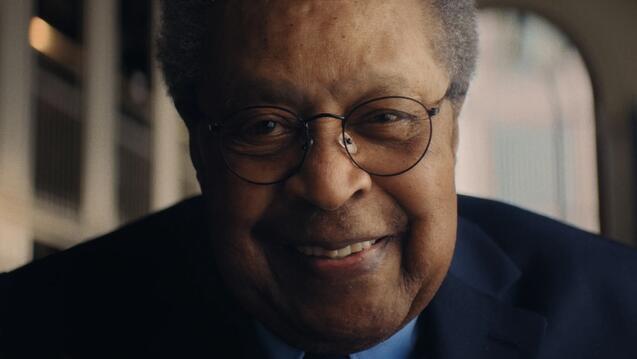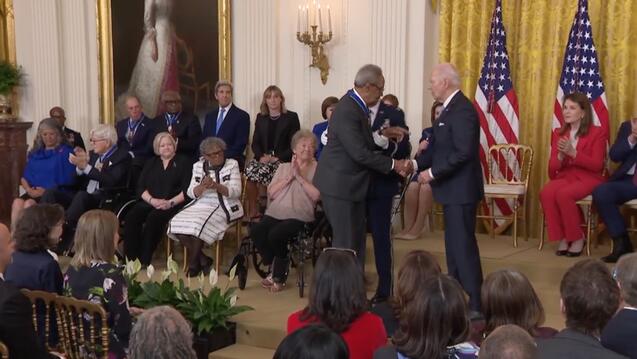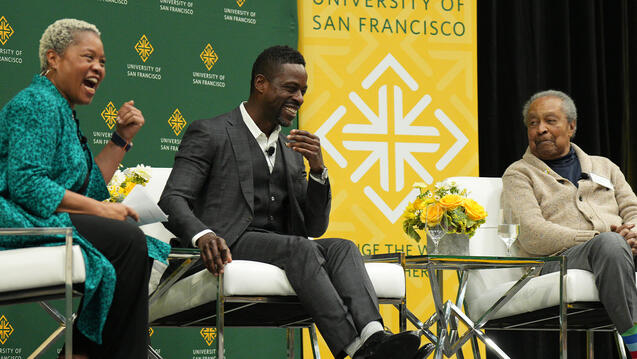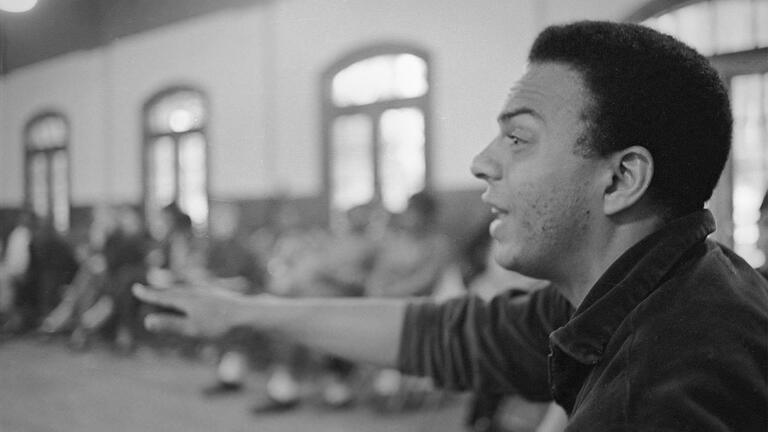
Civil Rights Icons Unite to Pass the Baton to the Next Generation
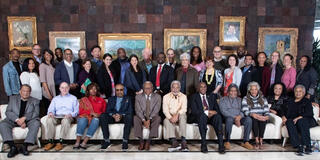
The Institute for Nonviolence and Social Justice (INSJ) launched by bringing together surviving leaders of the Black Freedom Movement of the 1950s and 1960s together with current social justice activists at the Annenberg Retreat at Sunnylands to honor the 90th birthday of Dr. Martin Luther King, Jr on Jan. 15, 2019.
Throughout the weekend retreat, civil rights heroes from Dr. King’s Southern Christian Leadership Conference, the Student Nonviolent Coordinating Committee (SNCC), and the Little Rock Nine — men and women Dr. Clarence B. Jones calls “the founding fathers and mothers of the Second Reconstruction in America” — engaged in intensive dialogue with interfaith clergy, distinguished historians, and young leaders from across the nation working today to stop gun violence, secure the right to vote, protect democracy, address the threat of climate change, and defend human rights everywhere.
Reporting on the historic gathering for the Washington Post, (”MLK at 90: An urgent call to action”), journalist Jonathan Capehart wrote that his participation in the Sunnylands dialogue “will remain one of the true honors of my life.”
Civil Rights Testaments
Over the years following the Sunnylands retreat, we have worked closely in partnership with the Wondros creative production company and the Open Society Foundations to film lengthy interviews with conference participants and other magnificent civil rights veterans throughout the country. We assembled a library of oral history videos to be available to everyone online and in association with the National Museum of African American History and Culture.
Filmed interview subjects include Joan Baez, Harry Belafonte, Taylor Branch, Minnijean Brown, Dr. Clayborne Carson, Xernona Clayton, Rev. Dr. Gerald Durley, Rev. Dr. Robert Franklin, Dr. Clarence B. Jones, Rev. Dr. Bernard Lafayette, J.T. Johnson, Robert Parris (Bob) Moses, Rev. Dr. C.T. Vivian, and Ambassador Andrew J. Young.
Voices of the Movement
After the Sunnylands gathering, Capehart conducted follow-up interviews with participants to produce a nine-part series for his Washington Post podcast titled “Voice of the Movement," including the following stories from Andrew Young, Dr. King’s closest strategic advisor among the SCLC leadership, and Minnijean Brown-Trickey, one of the Little Rock Nine:

Ambassador Andrew J. Young
Andrew Young: "Dr. King used to say that some of us are not going to make it to 40. He said, but if we make it 40, we can make it to 100. Well, Dr. King didn’t make it to 40. So it becomes an obligation for me to keep doing whatever I can do, as long as I can do it.”
Jonathan Capehart: “Andrew Young’s refrain, ‘What we have to say to these kids,’ was repeated a lot over the weekend. The implicit mission was clear: Pass the baton to the next generation of leaders. It drove every conversation.”
Andrew Young: “The spiritual foundations on which all social change rests is to redeem the soul of America from the triple evils of racism, poverty and war…. Its evolution a more perfect union, a better society, toward an end to hunger. And to an environment that is not in the process of destroying the Earth.
Now, I didn’t come for nonviolence. I just ended up in the middle of this. But I’ve never been in any situation where violence would have helped me more than thoughtful nonviolence.”
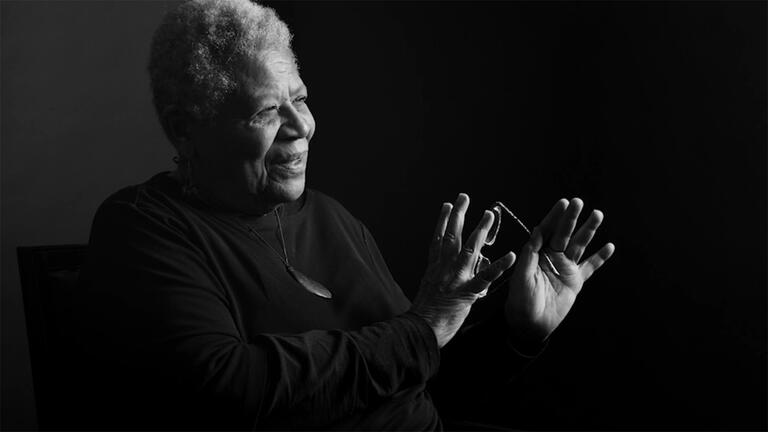
Minnijean Brown-Trickey
In September 1957, a group of nine Black high school students defied racist mobs attacking them as they tried to enter Central High School in Little Rock, Arkansas. At 16 years old, Minnijean Brown became one of the Little Rock Nine. President Eisenhower called the U.S. Army to escort the students into the school. Once inside, without protection against racist violence, the young students desegregated the school. With immense courage throughout this experience, and throughout the subsequent years, Brown-Trickey has illuminated the transformative power of nonviolence.
I became something very special because of nonviolence…
We’re brainwashed in the United States about “democracy” and “freedom.” Even in the Jim Crow South, we’re still pledging allegiance and saying anthems.
Emmett Till was 14 when he was lynched [in Mississippi, 1955]. He was one month older than I was. Segregation was everywhere, and meanness was everywhere, and violence was everywhere. Hatred. It was intended to destroy us. It was intended to discourage us. It was to tell us that we were worthless, and really what it did was the absolute opposite.
We all defied. We all got on the bus, sat in the front seat, got kicked off. We all drank out of the white water fountains.
When we finally got into the school [Central High], they kicked you downstairs, threw garbage, spit on you, dropped acid on you, made holes in your clothes. Melba Pattillo got acid in her eyes. It was designed to break our spirits.
A person did a study of white women later, about why they hated me so much. And they said they hated me because I walked the halls of Central like I belonged there. I could see why they would hate me. I was a beacon. We were beautiful.
I learned on that first day with all that was I’ll never be a hater for any reason. You can’t... I don’t think you can make me hate.
That was my training right there. The violence trained me to be nonviolent.
What is our touchstone, if it's not nonviolence? It just includes everything. It includes relationships with people, relationships with the Earth. It just includes everything.

Rev. Bernard Lafayette
The goal of nonviolence is to win people over by showing them love. We don't feel that there are people who are evil. There are people who do a lot of evil things, but they are human beings, conditioned by their environment. So therefore, they also can be unconditioned. They can change. And we have to believe that people can change.
The point of nonviolence is to win them over. And the way you win them over is by your own behavior. Don't allow people to cause you to be violent because they are violent. Because violence begets violence.
[In spring 1961, Bernard Lafayette was among the first to join the Freedom Riders to integrate interstate travel in the Jim Crow South. On May 14, when the bus arrived in Anniston, Alabama, a mob of 50 men armed with pipes, chains, and bats smashed windows, slashed tires, and then firebombed the bus.] The bus had been burned in Anniston, and we were continuing the freedom rides. The training had to do with being able to discipline your emotions so you would be able to respond and stay in control of yourself, so you have every potential of controlling the situation.
The first time I saw the Ku Klux Klan, straight up and cozy, was in the Birmingham bus station [shortly after the Anniston bombing], I had fallen asleep and one of the Klan members went and got some cold water and splashed it in my face. These were Klan members with robes on. I looked in his face, and there was hatred. He was waiting for me to do something. I found his eyes and I said, “Thank you.” My response, because of my training, was not what he expected to happen. I was fighting back in a very effective way.
We have to look at the goal that we are trying to accomplish, and that is to change conditions.
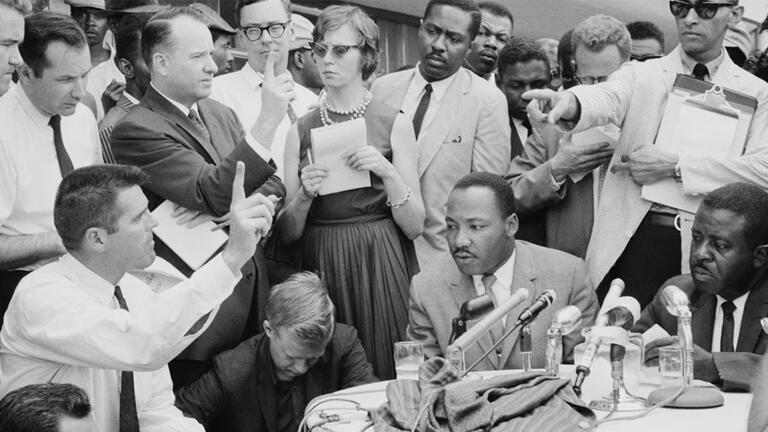
Dr. Clarence B. Jones
I just walked up to him, took my left hand and grabbed his right shoulder and arm, and took my right hand and put it in his right hand and pulled him up, pulled myself up close to him, tears coming down in my eyes a bit, and I said, “Dr. King, when do you want me to go to Montgomery, Alabama?” That’s what I call the making of a disciple.
The genius of Martin Luther King was that he summoned the conscience of America through peaceful nonviolent confrontation with racial segregation, so that the conscience of the 88 percent of the country would be forced to see the contradiction between the way in which it treated 12 percent of its people, people of color, and the commandments in the Declaration of Independence and our Constitution.
Martin King said, “I’m going to take you on a road of peaceful, redemptive recovery to recover your soul. And I’m going to do this nonviolently. You can put me in jail, you can bomb my house, you can threaten me. But at the end of all those things, I’m still going to love you, because I believe in you, America.
It is no longer a choice, my friends, between violence and nonviolence. It is either nonviolence or nonexistence.”
Dr. Martin Luther King, Jr.
